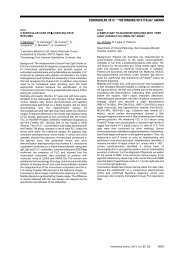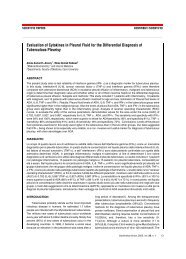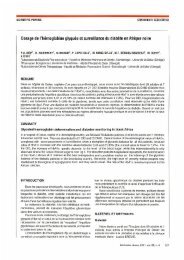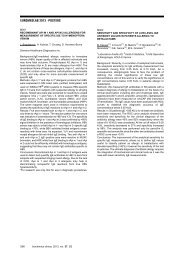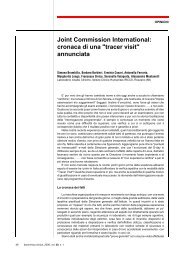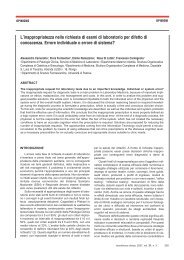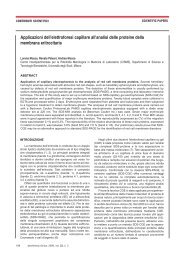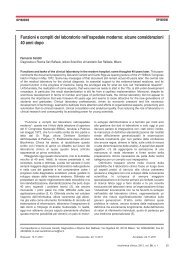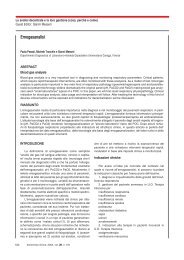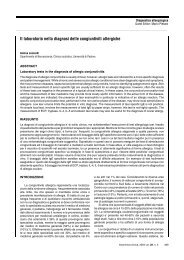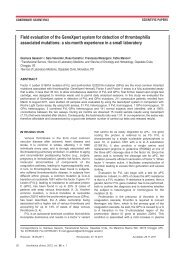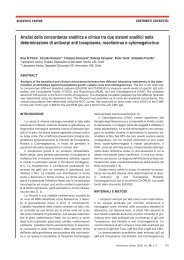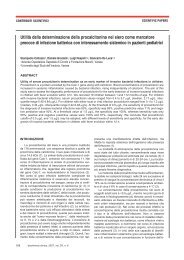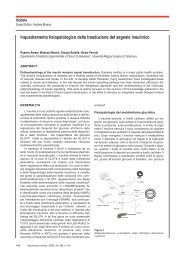CEPLIS TELEGRAM
CEPLIS TELEGRAM
CEPLIS TELEGRAM
Create successful ePaper yourself
Turn your PDF publications into a flip-book with our unique Google optimized e-Paper software.
<strong>CEPLIS</strong> <strong>TELEGRAM</strong><br />
European Council of the Liberal<br />
Professions<br />
Coudenberg 70B<br />
1000 Brussels<br />
Tel: +32.2.511.44.39<br />
Fax : +32.2.511 01 24<br />
Email : ceplis@scarlet.be<br />
http://www.ceplis.org<br />
Date: 15/02/2013 Pages: 8 N°03/13<br />
- Summary of the EP IMCO Committee voting results of the<br />
23 rd January 2013 on the amendments of 2005/36/EC<br />
Directive<br />
- <strong>CEPLIS</strong> Treasurer meets MEPs for the creation of an EP<br />
Intergroup on the Liberal Professions<br />
- Experts for Horizon 2020 Advisory Groups : Call for<br />
expression of interest<br />
- <strong>CEPLIS</strong> participates in the workshop « Global Advertising<br />
Solutions to reach EU citizens »<br />
- Forthcoming events:<br />
Health Working Group of <strong>CEPLIS</strong><br />
Eurelpro conference “Emerging challenges in the<br />
impact of taxes on pensions”<br />
European Legislation on Data Protection
Summary of the EP IMCO Commission voting results of the 23 rd January 2013<br />
on the amendments to 36/2005/EC Directive<br />
As you already know, on Wednesday the 23 rd of January 2013 the EP’s<br />
IMCO Committee voted on the Vergnaud Report relating to the<br />
modernization of Directive 36/2005/EC on the recognition of<br />
Professional Qualifications. MEPs succeeded in giving a clear vision of<br />
their expectations regarding the modernisation of the Directive.<br />
In general, IMCO has rather supported an “upward” harmonisation of<br />
professional qualifications in the EU. The Reporteur Ms Vergnaud, MEP<br />
(S&D) declared that “the voting reflects the EU Parliament’s willingness to improve the tools of the<br />
2005 Directive, to propose new ones and to improve and secure European professional movements”.<br />
Following the vote, it is interesting to highlight the following points:<br />
- MEPs agreed on the introduction of a European Professional Card (EPC) aiming at facilitating<br />
the administrative procedures for migrant professionals. This card will take the form of an<br />
electronic certificate delivered by the home country. It will be based on IMI, the electronic<br />
information system for the internal market that will be reviewed for that purpose.<br />
- Concerning the Alert Mechanism, in case of a removal of the right to practice in a Member<br />
State, all the other Member States will be informed of this prohibition through an alert<br />
mechanism(IMI). Always according to the Report, all Member States should be informed of<br />
any conviction or disciplinary decisions regarding a professional within 48 hours. MEPs have<br />
also added guarantees concerning the presumption of innocence.<br />
- Partial Access, aiming at facilitating the recognition of professions not recognized in a<br />
number of countries, will still be impossible in the field of the 7 professions benefiting from<br />
automatic recognition and for those professions that are not fully qualified in their home<br />
country. A single authority will be competent to decide on the refusal of partial access and<br />
to define reasons of general interest that can justify such refusals.<br />
- Relating to Language tests, IMCO confirmed that only the competent authorities of the host<br />
countries should have the right to evaluate the language skills of healthcare professionals<br />
after the recognition of their qualifications but before the authorization to exercise the<br />
profession.<br />
- Relating to Continuous Professional Development, the IMCO Committee proposes to<br />
encourage Member States to introduce frames for compulsory continuous training of health<br />
professionals in certain sectors (physicians, nurses, dentists, midwives). MEPs have also<br />
proposed to evaluate CPD by an assessment Body (European Quality Assurance Register).<br />
- MEPs have also adopted very positive amendments on the Common Training Frameworks.<br />
The Report provides that this bridge towards automatic recognition is extended to specialties<br />
of the professions that belong to the automatically recognised ones. In addition, the<br />
Parliament’s text specifies that Common Training Frameworks should be drafted with the<br />
collaboration of professional organisations.<br />
- Concerning the problem of switching from 10 to 12 years of compulsory general education<br />
before entering a Nursing School, proposed by the EU Commission, most of MEPs have<br />
preferred to support a compromise, accepting the 12 years and at the same time the 10
years of general education subject to the condition that specific competences common to<br />
both categories are listed and regularly updated.<br />
- Moreover, MEPs have decided that the Directive should cover also internships as an integral<br />
part of professional experience. The EP pronounced itself in favour of the inclusion of nonpaid<br />
internships, despite of what the EU Commission had proposed, since non-paid<br />
internships could be part of the training giving access to regulated professions.<br />
<strong>CEPLIS</strong> Treasurer meets MEPs for the creation of an EP Intergroup on the<br />
Liberal Professions<br />
Mr. Armand Gersanois, Treasurer of <strong>CEPLIS</strong>, has recently met with several MEPs in order to discuss<br />
the possibility of setting up an EP intergroup on liberal professions. The reaction of the MEPs was<br />
overall very positive.<br />
Mr. Armand Gersanois has recently had the<br />
opportunity to meet several MEPs in order to<br />
present the project of <strong>CEPLIS</strong> relating to the<br />
setting up of an "Intergroup on the liberal<br />
professions." The group in question would aim at<br />
bringing together representatives of our<br />
professions with MEPs in order to inform them<br />
about the needs and wishes of our sector. Mr.<br />
Gersanois has notably discussed with:<br />
- Mr. Joseph Daul, MEP President of the EPP<br />
Group, who has received him in the premises of<br />
the European Parliament in Brussels on the 30 th of January. Mr. Daul is very sensitive to the problems<br />
of liberal professions in Europe and has agreed to join a future group.<br />
- Mr. Kritonas Arsenis, MEP Member of the S&D Group, who is also interested in participating at<br />
this group, and is particularly sensitive to the problems of the health sector.<br />
Our Treasurer has also met with collaborators of other MEPs such as Constance Le Grip (EPP),<br />
Françoise Grossetête (EPP) and Sandrine Aries (EELV), who were equally very interested in our<br />
project.
Experts for Horizon 2020 Advisory Groups: Call for expression of<br />
interest<br />
“Horizon 2020” is the financial instrument implementing “Innovation Union”. Innovation Union<br />
means more jobs, improved lives and a better society in the EU. Horizon 2020 is in fact an initiative<br />
aiming at securing Europe's global competitiveness. Running from 2014 to 2020 with a €80 billion<br />
budget, this new programme of the EU for Research and Innovation is part of the drive to create new<br />
growth and jobs in the Union.<br />
Horizon 2020 provides a simplification through a single set of rules which will combine all research<br />
and innovation funding currently provided through the Framework Programmes for Research and<br />
Technical Development, the innovation related activities of the Competitiveness and Innovation<br />
Framework Programme (CIP) and the European Institute of Innovation and Technology (EIT).<br />
The proposed support for research and innovation under Horizon 2020 will be the strengthening of<br />
the position of the EU in science and the strengthening of our industrial leadership in innovation with<br />
investments in key technologies, providing also an assistance to address major concerns shared by all<br />
European citizens (climate change, developing sustainable transport and mobility, making renewable<br />
energy more affordable, etc.).<br />
Regarding the implementation of Horizon 2020, the European Commission is responsible for drawing<br />
up work programmes. In doing so, the Commission wishes to take account of advice and inputs<br />
provided by several advisory sources, including Advisory Groups of high level experts. Thus, the<br />
Commission is widening its search for experts from all fields to participate in shaping the agenda of<br />
Horizon 2020: the first calls are expected to be published by the end of 2013. The Commission<br />
services plan to set up some Advisory Groups covering the Societal Challenges and other objectives<br />
of Horizon 2020.<br />
The purpose of this call for expression of interest is to reach the widest range of individuals and<br />
actors (later to be divided into expert groups) with profiles able to contribute to the EU's vision and<br />
objectives for Horizon 2020 and to gain consistent and consolidated advice of high quality. Each<br />
group should count from 20 to 30 experts that will be representative of the broad constituency of<br />
stakeholders, including industry and research actors, representatives of collective interests groups of<br />
civil society, for each of the Horizon 2020 challenges or objectives. The experts will be designated<br />
according to the Commission rules.
Expertise is called especially for the following areas:<br />
o Future and Emerging Technologies (FET)<br />
o Marie-Curie actions on skills, training and career development<br />
o Research infrastructures<br />
o Leadership in enabling industrial technologies within these areas: Information and<br />
Communication Technologies, nanotechnologies, biotechnology, etc.<br />
o Access to risk finance<br />
o Innovation in small and medium-sized enterprises<br />
o Health, demographic change and wellbeing<br />
o Food security, sustainable agriculture, marine and maritime research and the bio-economy<br />
o Secure, clean and efficient energy<br />
o Smart, green and integrated transport<br />
o Climate action, resource efficiency and raw materials<br />
o Inclusive, innovative and secure societies<br />
The composition of the expert groups will be established not only by taking into account the different<br />
characteristics of the specific challenge (or objective) of the Horizon 2020, but also according to some<br />
default profiles such as experts with scientific expertise related to the societal challenge (or<br />
objective) in question, experts focused on the technological aspects of the challenge, experts focused<br />
on non-technological innovation like social innovation, experts having a good understanding and<br />
experience of the relevant marketplace (including experienced entrepreneurs and end-users),<br />
experts representing the views of civil society relevant for the challenge (or objective) in question<br />
and many other profiles.<br />
For further information please contact our Secretariat.
<strong>CEPLIS</strong> participates in the workshop “Global Advertising Solutions to reach EU<br />
citizens”<br />
On the 10 th of January, <strong>CEPLIS</strong> has participated in a workshop organized by the communication<br />
agency TIPIK regarding the possibilities for European organizations to advertise and communicate.<br />
This event, which brought together communication experts and professionals from different<br />
European institutions and associations, enabled us to discuss the opportunities and threats that<br />
exist when launching a communication campaign aiming at reaching European Citizens. 2013 is<br />
indeed the "European Year of Citizens".<br />
Ms Nathalie Bobineau, International<br />
Network Managing Director at France<br />
Télévisions Publicité International (France 2,<br />
France 3, TV5…), launched the workshop<br />
with a general discussion on the evolution<br />
and the consumption of media by European<br />
citizens. With supporting figures, she<br />
identified the communication channels that<br />
are the most appropriate for such<br />
campaigns. We learned that television is<br />
still a powerful medium, even though the<br />
internet, and in particular the mobile<br />
Internet is constantly evolving. Other<br />
impressive figures showed that, far from being interchangeable media, internet and television are<br />
complementary. 73% of internet users in Europe watch TV online and 48% surf the Internet while<br />
they watch TV 1 .<br />
The second part of the workshop was dedicated to a dialogue on the analysis of citizens' needs for<br />
information and how European associations and institutions could respond. This exchange was very<br />
interesting, especially in view of the work of <strong>CEPLIS</strong>’ Working Group "Communications" and the new<br />
strategies that our organization could develop. We have better understood the need to develop an epresence<br />
(Twitter, Wikipedia ...) in order to have a credible image. It was also demonstrated how an<br />
organization following the technological developments can reach a large number of followers at the<br />
lowest price.<br />
1 Source Mediascope Europe - June 2012
Health Working Group of <strong>CEPLIS</strong><br />
When? The 16 th of April 2013<br />
Who? Organised by <strong>CEPLIS</strong><br />
Where? Coudenberg 70<br />
1000 Brussels<br />
Belgium<br />
FORTHCOMING EVENTS<br />
What? As confirmed during the Health Working Group of the 22nd of last January,<br />
the coming meeting of the Working Group will take place the 16th of April<br />
2013 in the premises of <strong>CEPLIS</strong> in Brussels.<br />
Eurelpro conference "Emerging challenges in the impact of taxes on pensions"<br />
When? The 25th of February 2013 - 9:30 - 18:00<br />
Who? Organised by Eurelpro<br />
Where? European Economic and Social Committee<br />
Room JDE 62<br />
Rue Belliard 99<br />
1040 Brussels<br />
What? The issue of tax is at the heart of an improved fiscal coordination within the<br />
EU whilst at the same time the cost-effectiveness of pension provisions and<br />
savings becomes a crucial challenge in periods of budget consolidation and<br />
austerity. So that budget consolidation remains conducive to growth, the<br />
Commission invites Member States to look at tax revenues generally as well<br />
as taxation expenditure. It is widely accepted that tax measures will<br />
increasingly play a fundamental role in setting incentives or disincentives for<br />
preferred social objectives.<br />
This event is taking place firmly in the context of the White Paper on<br />
pensions and the Commission’s forthcoming social investment package.<br />
Registration? To participate please register at info@eurelpro.eu.
European Legislation on European Data<br />
What? The 15 th of March 2013 – 9:15-17:00<br />
Who? Organised by « Délégation des Barreaux de France »<br />
Where? Avenue de la Joyeuse Entrée, 1<br />
B-1040 Brussels<br />
Belgium<br />
What? These “European interviews” are aiming to present the abundant legislation<br />
and jurisprudence of European law on Data Protection. It is also the<br />
opportunity to think about emerging issues related to the protection of<br />
personal data and their interactions with the legal profession.<br />
This event will bring together senior officials from the European<br />
institutions, lawyers and known personalities, such as the European Data<br />
Protection Supervisor, who will lead the discussions.<br />
Registration? Via Internet : http://www.dbfbruxelles.eu/inscription.htm



